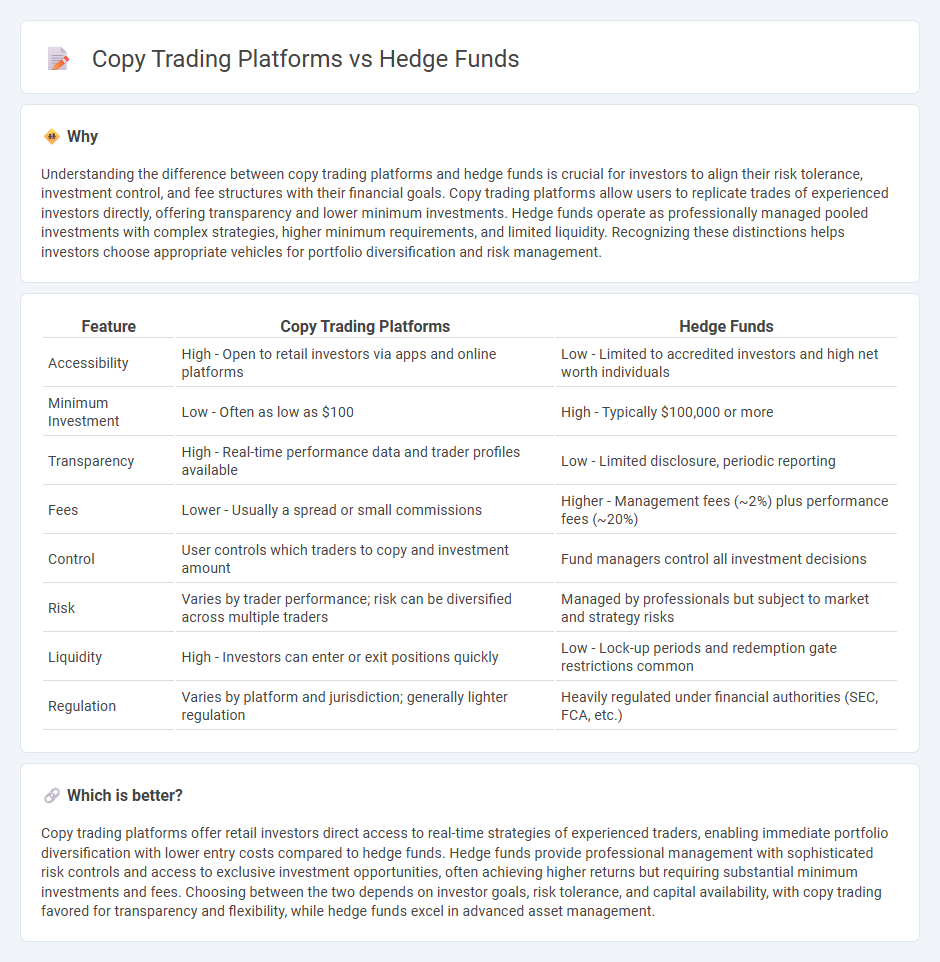
Copy trading platforms enable investors to automatically replicate the trades of experienced traders, offering real-time market exposure with lower fees and greater transparency compared to traditional hedge funds. Hedge funds employ professional managers using diverse strategies to achieve high returns, typically requiring high minimum investments and imposing performance-based fees. Explore how each option can fit your investment goals by understanding their unique advantages and risks.
Why it is important
Understanding the difference between copy trading platforms and hedge funds is crucial for investors to align their risk tolerance, investment control, and fee structures with their financial goals. Copy trading platforms allow users to replicate trades of experienced investors directly, offering transparency and lower minimum investments. Hedge funds operate as professionally managed pooled investments with complex strategies, higher minimum requirements, and limited liquidity. Recognizing these distinctions helps investors choose appropriate vehicles for portfolio diversification and risk management.
Comparison Table
| Feature | Copy Trading Platforms | Hedge Funds |
|---|---|---|
| Accessibility | High - Open to retail investors via apps and online platforms | Low - Limited to accredited investors and high net worth individuals |
| Minimum Investment | Low - Often as low as $100 | High - Typically $100,000 or more |
| Transparency | High - Real-time performance data and trader profiles available | Low - Limited disclosure, periodic reporting |
| Fees | Lower - Usually a spread or small commissions | Higher - Management fees (~2%) plus performance fees (~20%) |
| Control | User controls which traders to copy and investment amount | Fund managers control all investment decisions |
| Risk | Varies by trader performance; risk can be diversified across multiple traders | Managed by professionals but subject to market and strategy risks |
| Liquidity | High - Investors can enter or exit positions quickly | Low - Lock-up periods and redemption gate restrictions common |
| Regulation | Varies by platform and jurisdiction; generally lighter regulation | Heavily regulated under financial authorities (SEC, FCA, etc.) |
Which is better?
Copy trading platforms offer retail investors direct access to real-time strategies of experienced traders, enabling immediate portfolio diversification with lower entry costs compared to hedge funds. Hedge funds provide professional management with sophisticated risk controls and access to exclusive investment opportunities, often achieving higher returns but requiring substantial minimum investments and fees. Choosing between the two depends on investor goals, risk tolerance, and capital availability, with copy trading favored for transparency and flexibility, while hedge funds excel in advanced asset management.
Connection
Copy trading platforms and hedge funds are connected through their shared focus on leveraging expert investment strategies to maximize returns. Copy trading platforms enable retail investors to replicate hedge fund managers' trades in real-time, democratizing access to sophisticated financial tactics traditionally reserved for institutional investors. This integration fosters increased market liquidity and provides hedge funds with additional capital flow from a broader investor base.
Key Terms
Active Management
Hedge funds employ active management by leveraging expert strategies, extensive research, and dynamic risk controls to achieve superior returns. Copy trading platforms enable retail investors to replicate the trades of experienced managers, offering a more accessible, though often less customizable, approach to active management. Explore how active management techniques differ between hedge funds and copy trading platforms to optimize your investment strategy.
Risk Strategy
Hedge funds implement complex risk management strategies, including diversification, leverage control, and advanced derivatives, to maximize returns while mitigating losses. Copy trading platforms often expose investors to the performance risks of individual traders, with less structured risk controls and higher volatility. Explore further to understand which risk strategy aligns best with your investment goals.
Accessibility
Hedge funds typically require high minimum investments, restricting access to affluent investors and institutional players, whereas copy trading platforms offer a low-entry barrier appealing to retail traders by enabling them to replicate expert strategies with minimal capital. Copy trading platforms provide real-time performance data and social trading features, increasing transparency and user engagement, while hedge funds operate with less public visibility and complex fee structures. Explore the differences to find the most accessible investment approach suited to your financial goals.
Source and External Links
Hedge Funds: Overview, Recruitment, Careers & Salaries - Hedge funds are investment firms that raise capital from institutional and accredited investors to invest in financial assets using diverse and often sophisticated strategies aimed at achieving absolute returns rather than relative returns.
Hedge Funds - Hedge funds are private, unregistered investment funds pooling money from investors to invest in various assets with the goal of positive returns and generally limited to accredited investors, using more flexible and riskier strategies than mutual funds or ETFs.
Hedge fund - Hedge funds use complex trading and risk management techniques, typically charging management and performance fees, and their strategies range from traditional hedging to highly leveraged and speculative investments, influencing market liquidity and risk.
 dowidth.com
dowidth.com